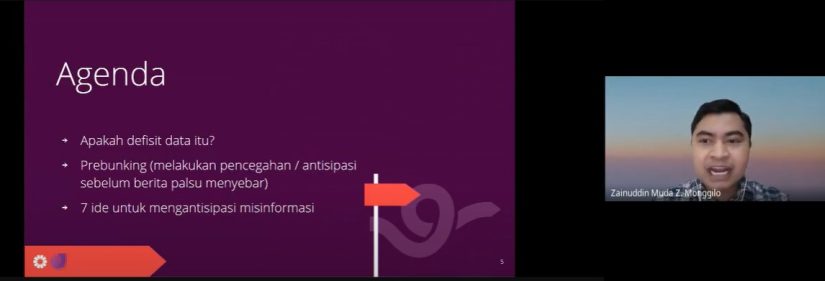
Yogyakarta, March 30th 2022─In an effort to fight hoaxes and train academicians to fact check, the Department of Communication Studies (Dikom) in the Faculty of Social and Political Science (Fisipol) of Gadjah Mada University in collaboration with Indonesia Independent Journalist Association (AJI) and Google News Initiative (GNI) held two workshops in the end of 2020. Zainuddin Muda Z. Monggilo, a communication studies lecturer, was the speaker in both workshops.
On December 14th-18th 2020, Zainuddin (from here on called Zam) with Aghnia Adzkia, Senior Visual & Data Journalist BBC East Asia, gave a fact check training with Fisipol UGM academicians. In this workshop, Zam and Aghnia introduced the tools that we could use to check facts. Other than that, there are at least six materials that were delivered. First, understanding misinformation and disinformation in Indonesia. Second, surveying social media, blogs, and websites. Third, analyzing content sources and social media accounts. Fourth, verifying photos, videos, locations, and time. Fifth, understanding the ethics of fact-checking. Finally, understanding digital security and safety. Aghnia said that journalists now are more strict with verifying information and presenting facts.

The next workshop was held on 26-30th July 2021. On this occasion, Ratna Ariyanti from AJI Indonesia was the speaker with Zam. The workshop, which was held with the help of AJI Indonesia and which adapted the material from First Draft News, especially highlighted the Covid-19 hoax. There were ten materials given in the workshop, two of which talked about disinformation and misinformation on vaccines and how to do online visual content verification. Ratna said that conspiracy theories about vaccines made the Covid-19 management hard, even in the United States, the country she pursued her studies in.
“Both of these activities are meant to ground the practices of fact-checking in the academic sphere so that academicians can help in combating information problems in the digital platform,” Zam said.
This workshop was welcomed by the Fisipol lecturers who were the participants. Novi Kurnia, a lecturer of communication studies who is also the Coordinator of Digital Literacy Activist, said that this kind of activity can increase critical digital literacy skills among academicians, especially when it comes to verifying, analyzing, and evaluating information in digital channels. Sari Handayani, a lecturer at Fisipol UGM Social Development and Welfare Department said that she got a lot of new skills, especially digital tools that she has not used optimally.
“With the tools and tips that I gained throughout the workshop, I can correct the hoax that circulates in chats,” said Theresia Octastefani, a lecturer from Fisipol UGM Politics and Government Department.
Zam, who is also a certified AJI Indonesia and GNI trainer, hopes that both workshops can create immunity against hoaxes. He also said that this effort can activate collaboration and education between parties to suppress the circulation of hoaxes. Zam with a network of other trainers continues to give fact-checking workshops to university students, university student organizations, and the civil society community until now.
